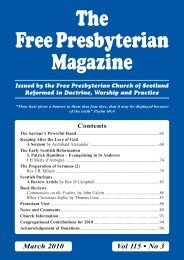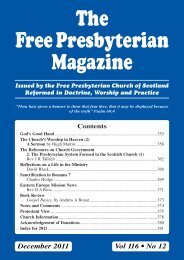The <strong>Free</strong> <strong>Presbyterian</strong> Church <strong>of</strong> <strong>Scotland</strong>Moderator <strong>of</strong> Synod: Rev K D Macleod BSc, F P Manse, Ferry Road, Leverburgh, Isle <strong>of</strong> Harris, HS5 3UA.Clerk <strong>of</strong> Synod: Rev J MacLeod MA, 6 Church Avenue, Sidcup, Kent, DA14 6BU; tel: 0208 309 1623, e-mail:JMacL265@aol.com.Assistant Clerk: Rev J R Tallach MB ChB, 2 Fleming Place, Stornoway, HS1 2NH; tel: 01851 702501.General Treasurer: Mr W Campbell, 133 Woodlands Road, Glasgow, G3 6LE; tel: 0141 332 9283, fax 0141 332 4271,e-mail: wc.fp<strong>church</strong>@btconnect.com.Law Agents: Brodies LLP, 15 Atholl Crescent, Edinburgh, EH3 8AH; tel: 0131 228 3777.Clerks to Presbyteries:Nor<strong>the</strong>rn: Rev G G Hutton BA, 11 Auldcastle Road, Inverness, IV2 3PZ; tel: 01463 712872.Sou<strong>the</strong>rn (pro tem): Rev J L Goldby MA, 23 Upper Cairncastle Road, Larne, BT40 2EF; tel: 02828 274865.Western: Rev A E W MacDonald MA, F P Manse, Gairloch, Ross-shire, IV21 2BS; tel: 01445 712247.Outer lsles: Rev K D Macleod BSc, F P Manse, Ferry Road, Leverburgh, Isle <strong>of</strong> Harris, HS5 3UA; tel: 01859 520271.Australia and New Zealand: Rev G B Macdonald BSc, 60 Hamilton St, Riverstone, NSW 2765; tel. 02 9627 3408.Zimbabwe: Rev S Khumalo, Stand No 56004, Mazwi Road, Lobengula, PO Magwegwe, Bulawayo; tel: 00263 9407131.Zimbabwe Mission Office: 9 Robertson Street, Parkview, Bulawayo; tel: 002639 62636, fax: 002639 61902, e-mail:fp<strong>church</strong>@mweb.co.zw.Residential Care Homes:Ballifeary House, 14 Ness Walk, Inverness, IV3 5SQ; tel: 01463 234679.Leverburgh Residential Care Home, Ferry Road, Leverburgh, Isle <strong>of</strong> Harris, HS5 3UA; tel: 01859 520296.Website <strong>of</strong> <strong>the</strong> <strong>Free</strong> <strong>Presbyterian</strong> Church <strong>of</strong> <strong>Scotland</strong>: www.fp<strong>church</strong>.org.uk.The <strong>Free</strong> <strong>Presbyterian</strong> MagazinePublished by The <strong>Free</strong> <strong>Presbyterian</strong> Church <strong>of</strong> <strong>Scotland</strong> (Scottish Charity Number SC003545). Subscriptions andchanges <strong>of</strong> address to be sent to <strong>the</strong> General Treasurer, Mr W Campbell, 133 Woodlands Road, Glasgow, G3 6LE;tel: 0141 332 9283. The subscription year begins in January. Prices are on back cover. One month’s notice is requiredfor change <strong>of</strong> address. Queries about delivery <strong>of</strong> <strong>the</strong> magazines should be sent to <strong>the</strong> General Treasurer, not <strong>the</strong> printer.Editor: Rev K D Macleod BSc, F P Manse, Ferry Road, Leverburgh, Isle <strong>of</strong> Harris, HS5 3UA. Tel: 01859 520271; e-mail:kdmacleod@gmail.com. Unsigned articles are by <strong>the</strong> Editor.Editorial Board: The Editor, Rev N M Ross, Rev D W B Somerset.Deadline for sending material to <strong>the</strong> Editor: The beginning <strong>of</strong> <strong>the</strong> month previous to publication.The Gaelic Supplement (quarterly): Editor: Rev A W MacColl MA PhD, F P Manse, Swainbost, Isle <strong>of</strong> Lewis, HS2 0TA.Available free on request.Youth Magazine: The Young People's Magazine. Editor: Rev K D Macleod BSc.CommunionsJanuary: First Sabbath: Nkayi; Fifth: Auckland, Inverness, New Canaan.February: First Sabbath: Broadstairs; Second: Dingwall; Third: Stornoway; Fourth: North Uist, Zenka.March: First Sabbath: Larne, Sydney, Ullapool; Second: Ness, Portree, Tarbert; Third: Halkirk, Kyle <strong>of</strong> Lochalsh;Fourth: Barnoldswick, Ingwenya, North Tolsta.<strong>April</strong>: Second Sabbath: Leverburgh, Staffin; Third: Chesley, Gisborne, Laide; Fourth: Glasgow; Fifth: Mbuma.May: First Sabbath: Aberdeen, Grafton, London; Second: Achmore, Donsa, Fort William, New Canaan, Scourie; Third:Edinburgh; Fourth: Chiedza.June: First Sabbath: Auckland, Farr, Perth; Second: Nkayi, Santa Fe, Shieldaig; Third: Lochcarron, Uig; Fourth:Bulawayo, Gairloch, Inverness, Raasay.July: First Sabbath: Beauly; Second: Bonar Bridge, Staffin; Third: Applecross; Fourth: Struan; Fifth: Cameron.August: First Sabbath: Dingwall; Second: Leverburgh, New Canaan, Somakantana; Third: Laide; Fourth: Stornoway,Vatten, Zenka.September: First Sabbath: Chesley, Larne, Sydney, Ullapool; Second: Halkirk, Mnaka, Portree; Third: Tarbert; Fourth:Aberdeen, Barnoldswick, North Uist; Fifth: Ingwenya.October: First Sabbath: Dornoch, Grafton, Lochcarron, North Tolsta; Second: Gairloch, Ness; Third: London; Fourth:Edinburgh, Gisborne, Uig, Mbuma.November: Second Sabbath: Glasgow; Third: Wellington; Fourth: Chiedza.December: First Sabbath: Singapore; Third: Bulawayo, Santa Fe, Tauranga.
The<strong>Free</strong> <strong>Presbyterian</strong> MagazineVol 117 <strong>April</strong> 2012 No 4Thomas Manton and ContentmentManton was one <strong>of</strong> <strong>the</strong> better-known Puritans. Born in 1620 in Somerset,he was <strong>the</strong> son and <strong>the</strong> grandson <strong>of</strong> ministers. And, following studiesat Oxford University, he became a minister himself. His first charge was inStoke Newington, now a district <strong>of</strong> London. His published expositions on<strong>the</strong> Epistles <strong>of</strong> James and Jude are both based on his preaching <strong>the</strong>re. Afterspending seven years in Stoke Newington, he moved to St Paul’s Church inCovent Garden, London, where he succeeded Obadiah Sedgwick, ano<strong>the</strong>rPuritan, a volume <strong>of</strong> whose writings were reprinted in <strong>the</strong> twentieth century.Among those who sometimes attended Manton’s preaching in this <strong>church</strong> wasArchbishop Usher, who used to describe him as one <strong>of</strong> <strong>the</strong> “best preachersin England”.On some special occasion, Manton was appointed to preach before <strong>the</strong> LordMayor; he took a difficult subject and preached a learned sermon. The bettereducated among <strong>the</strong> congregation appreciated <strong>the</strong> discourse, and Mantonwas publicly thanked. However, on his way to <strong>the</strong> evening service, a poorman came up behind him and gently tugged <strong>the</strong> sleeve <strong>of</strong> his gown. Havingattracted <strong>the</strong> minister’s attention, <strong>the</strong> man spoke about his experience under<strong>the</strong> morning’s sermon: “I came here with earnest desire after <strong>the</strong> Word <strong>of</strong> Godand hopes <strong>of</strong> getting some good to my soul, but I was greatly disappointed;for I could not understand a great deal <strong>of</strong> what you said; you were quite aboveme”. Manton, who was not given to learned discourses, replied graciously:“Friend, if I did not give you a sermon, you have given me one; and by <strong>the</strong>grace <strong>of</strong> God, I will never play <strong>the</strong> fool to preach before my Lord Mayor insuch a manner again”.In common with most <strong>of</strong> <strong>the</strong> o<strong>the</strong>r Puritans, Manton’s conscience wouldnot allow him to continue in his charge in <strong>the</strong> changed ecclesiastical conditionsafter Charles II came to <strong>the</strong> throne. He was <strong>of</strong>fered <strong>the</strong> position <strong>of</strong> Dean <strong>of</strong>Rochester but refused to accept it. He continued to preach, however, and wasat one time arrested, though <strong>the</strong> conditions under which he was held wererelatively relaxed; sometimes he was even left with <strong>the</strong> keys <strong>of</strong> <strong>the</strong> jail. Sometime after his death in 1677, <strong>the</strong> 65 sermons he had preached on Hebrews 11
















